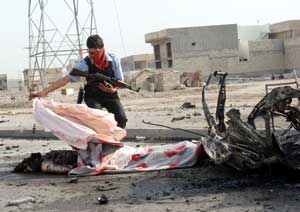| Home | Blog | Ask This | Showcase | Commentary | Comments | About Us | Contributors | Contact Us |

Who are the suicide bombers in Iraq?ASK THIS | June 08, 2005Journalists are finally turning their attention to the genesis of the wave after wave of suicide bombings that are devastating Iraq, but the sometimes conflicting reports still leave many unanswered questions. By Dan Froomkin Q. Who are these suicide bombers? What are their backgrounds? What motivates them? Who is organizing them? Where are they from? Q. To the extent that there are Iraqis among them – and Iraqis have not been suicide bombers in the past – what has made them turn to such a desperate measure? Q. To the extent that there are foreigners among them, is it true, as President Bush maintains, that they would have posed threats to the Q. To the extent that foreign terrorists are being lured to Iraq to blow themselves up, how do the Iraqis feel about being the bait? Q. Is the supply of potential suicide bombers finite or essentially without end? In either case, what measures can be used against them? Q. Is the evolution of de facto suicide-bomber assembly line eventually going to present a threat to the There has been a sharp surge in the number of suicide attacks across No one becomes a suicide bomber on a whim. Such a sad, dramatic, horrific act, utterly against human nature, would appear to require abiding and desperate political passion as well as a disciplined organization with the ability to indoctrinate and command total allegiance. Susan B. Glasser wrote about suicide bombers recently in The Washington Post. Her research was based largely on accounts of suicide bombers featured on Web sites run by radical Islamists. Who are the suicide bombers of But Carol J. Williams, writing in the Los Angeles Times, reports that “increasingly, Iraqis are believed to be carrying out some of the suicide attacks.” She quotes Saad Obeidi, a retired Iraqi major general and security expert, as suggesting two possible sources of suicide bombers. Some are foreigners, responding to what Obeidi called Bush’s invitation to Islamic extremists to bring their fight against Michael Howard and Ewen MacAskill, writing in Salon, assume that most suicide bombers are foreign, and conclude that American and Iraqi forces are losing the battle to prevent them from entering the country. Social scientists have studied the suicide-bomber phenomenon, and come to a variety of conclusions. Scott Atran, a research scientist at the As logical as the poverty-breeds-terrorism argument may seem, study after study shows that suicide attackers and their supporters are rarely ignorant or impoverished. Nor are they crazed, cowardly, apathetic or asocial. If terrorist groups relied on such maladjusted people, "they couldn't produce effective and reliable killers," according to Todd Stewart, a retired Air Force general who directs the Ohio State University program in international and domestic security.…. The body of research shows that over all, suicide terrorists tend not to have the attributes of the socially dysfunctional (fatherless, friendless, jobless). They don't vent fear of enemies or express hopelessness or a sense of "nothing to lose" because of lack of a career or social mobility as would be consistent with economic theories of criminal behavior. Suicide attackers don't opt for paradise out of despair. Michael Bond wrote in the New Scientist in 2004 that suicide bombers are invariably channelled by a disciplined, well-organized group into taking the path of self destruction in the fight against the enemy. While suicide terrorists invariably come from oppressed communities, recent research by psychologists, anthropologists and others suggests that they fit none of the other common profiles. They are no less rational or sane, no worse educated, no poorer and no more religious than anyone else…. It means that, in the right circumstances, anyone could be one…. What, then, would lead a sane, rational, educated and comfortably-off person to do something so irrational and extreme? The key, many researchers agree, lies with the organisation that recruits them. In the modern history of suicide terrorism it appears that every mission has been authorised and planned by a resistance group. Robert A. Pape, an associate professor of political science at the What nearly all suicide terrorist attacks actually have in common is a specific secular and strategic goal: to compel modern democracies to withdraw military forces from territory that the terrorists consider to be their homeland. Religion is often used as a tool by terrorist organizations in recruiting and in seeking aid from abroad, but is rarely the root cause. Suicide attacks in
|
|




